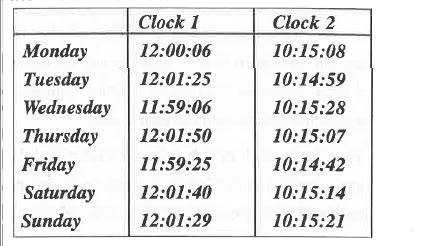Two clocks A and B being tested against a standard clock located in the national laboratory At 10.00 AM by the standard clock, the readings of the two clocks are shown in following table
DayClock AClock BIst10:00:068:15:00IInd10:01:138:15:0.1IIIrd9:59:0.88:15:04IVth10:02:158:14:58Vth9:58:108:15:02
If you are doing an experiment that requires precision time interval measurements, which of the two clocks will you prefer ?
The correct Answer is:Clock 2
To determine which clock, A or B, is preferable for precision time interval measurements, we need to analyze the readings of both clocks over the five time points provided. Precision in measurements refers to how closely the measurements are grouped together, regardless of their accuracy.
1. List the Readings:
- Clock A:
- 1st: 10:00:06
- 2nd: 10:01:13
- 3rd: 9:59:00.8
- 4th: 10:02:15
- 5th: 9:58:10
- Clock B:
- 1st: 8:15:00
- 2nd: 8:15:00.1
- 3rd: 8:15:04
- 4th: 8:14:58
- 5th: 8:15:02
2. Calculate the Differences Between Readings for Clock A:
- Between 1st and 2nd: 10:01:13 - 10:00:06 = 1 minute 7 seconds
- Between 2nd and 3rd: 10:01:13 - 9:59:00.8 = 2 minutes 12.2 seconds
- Between 3rd and 4th: 10:02:15 - 9:59:00.8 = 3 minutes 14.2 seconds
- Between 4th and 5th: 10:02:15 - 9:58:10 = 4 minutes 5 seconds
3. Calculate the Differences Between Readings for Clock B:
- Between 1st and 2nd: 8:15:00.1 - 8:15:00 = 0.1 seconds
- Between 2nd and 3rd: 8:15:04 - 8:15:00.1 = 3.9 seconds
- Between 3rd and 4th: 8:14:58 - 8:15:04 = 6 seconds
- Between 4th and 5th: 8:15:02 - 8:14:58 = 4 seconds
4. Analyze the Differences:
- For Clock A, the differences between readings are significantly larger, ranging from about 1 minute to over 4 minutes.
- For Clock B, the differences are much smaller, ranging from 0.1 seconds to 6 seconds.
5. Conclusion:
- Since precision is defined as the degree of closeness of the various readings to each other, Clock B has readings that are much closer together compared to Clock A. Therefore, for experiments requiring precise time interval measurements, Clock B is the preferred choice.
- Clock A:
- 1st: 10:00:06
- 2nd: 10:01:13
- 3rd: 9:59:00.8
- 4th: 10:02:15
- 5th: 9:58:10
- Clock B:
- 1st: 8:15:00
- 2nd: 8:15:00.1
- 3rd: 8:15:04
- 4th: 8:14:58
- 5th: 8:15:02
- Between 1st and 2nd: 10:01:13 - 10:00:06 = 1 minute 7 seconds
- Between 2nd and 3rd: 10:01:13 - 9:59:00.8 = 2 minutes 12.2 seconds
- Between 3rd and 4th: 10:02:15 - 9:59:00.8 = 3 minutes 14.2 seconds
- Between 4th and 5th: 10:02:15 - 9:58:10 = 4 minutes 5 seconds
- Between 1st and 2nd: 8:15:00.1 - 8:15:00 = 0.1 seconds
- Between 2nd and 3rd: 8:15:04 - 8:15:00.1 = 3.9 seconds
- Between 3rd and 4th: 8:14:58 - 8:15:04 = 6 seconds
- Between 4th and 5th: 8:15:02 - 8:14:58 = 4 seconds
- For Clock A, the differences between readings are significantly larger, ranging from about 1 minute to over 4 minutes.
- For Clock B, the differences are much smaller, ranging from 0.1 seconds to 6 seconds.
- Since precision is defined as the degree of closeness of the various readings to each other, Clock B has readings that are much closer together compared to Clock A. Therefore, for experiments requiring precise time interval measurements, Clock B is the preferred choice.
Similar Questions
Two clocks are being tested against a standard clock located in a national laboratory. At 12:00:00 noon by the standard clock, the readings of the two clocks are : If you are doing an experiment that requires 'precision time interval' measurements , which of the two clocks will you prefer ?
View SolutionTwo clocks are being tested against a standard clock located in a national laboratory. At 12:00:00 noon by the standard clock , the readings of the two clocks are : If you are doing an experiment that requires 'precision time interval' measurements, which of the two clocks will you prefer? c
View SolutionTwo clocks are being tested against a standard clock located in a national laboratory. At 12:00:00 noon by the standard clock , the readings of the two clocks are :

If you are doing an experiment that requires 'precision time interval' measurements, which of the two clocks will you prefer? c
View SolutionTwo clocks are being tested against a standard clock located in a national laboratory. At 12:00:00 noon by the standard clock, the readings of the two clocks are :
Clock1Clock 2Monday12:00:05:10:15:06Tuesday12:01:1510:14:18Wednesday11:59:0810:15:18Thursday12:01:5010:15:07Friday11:59:1510:14:53Saturday12:01:3010:15:24Sunday12:01:1910:15:11Sunday12:01:1910:15:11
If you are doing an experiment that requires precision time interval measurements, which of the two clocks will you prefer? The range of variation in time of clock ?
View SolutionTwo clocks are being tested against a standard clock located in a national laboratory .At 12:00:00 noon by the standard clock, the readings of the two clocks are {:(,"Day 1","Day 2","Day 3","Day 4" , "Day 5"),("Clock 1",12:00:04,12:02:19,12:01:50,11:59:04,11:59:08),("Clock 2",11:15:24,11:15:01,11:14:59,11:15:00,11:14:58):} Which of the two clocks will you prefer to measure the time intervals during an experiment ?
View SolutionTwo clocks are being tested against a standard clock located in a national laboratory. At 12 : 00 : 00 noon by the standard clock, the readings of the two clocks are : If you are doing an experiment that requires 'precision time interval' measurements, which of the two clocks will you prefer ?
View SolutionTwo clocks A and B being tested against a standard clock located in the national laboratory At 10.00 AM by the standard clock, the readings of the two clocks are shown in following table
DayClock AClock BIst10:00:068:15:00IInd10:01:138:15:0.1IIIrd9:59:0.88:15:04IVth10:02:158:14:58Vth9:58:108:15:02
If you are doing an experiment that requires precision time interval measurements, which of the two clocks will you prefer ?
View Solution
